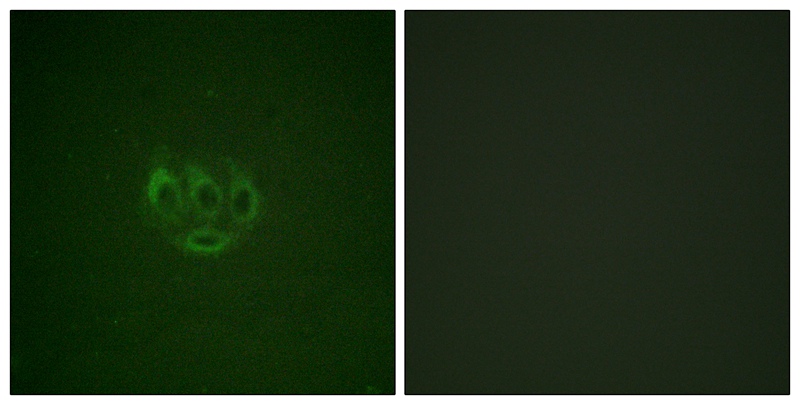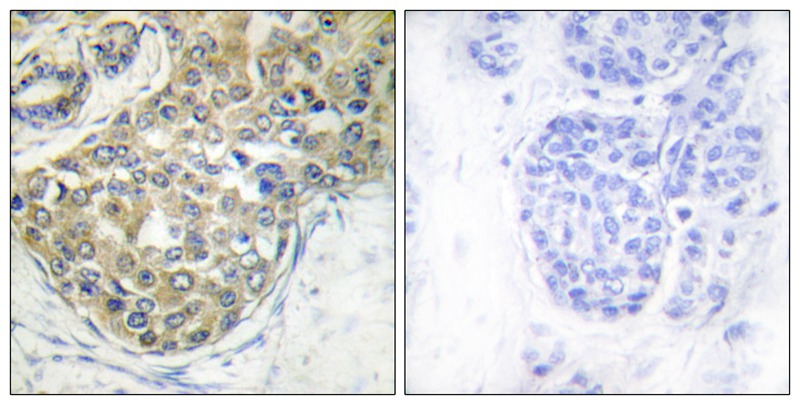


| WB | 咨询技术 | Human,Mouse,Rat |
| IF | 咨询技术 | Human,Mouse,Rat |
| IHC | 1/50-1/100 | Human,Mouse,Rat |
| ICC | 1/100-1/200 | Human,Mouse,Rat |
| FCM | 咨询技术 | Human,Mouse,Rat |
| Elisa | 咨询技术 | Human,Mouse,Rat |
| Aliases | ACK1; Activated p21cdc42Hs kinase; EC 2.7.10.2; kinase ACK1; |
| Entrez GeneID | 10188; |
| WB Predicted band size | 120kDa |
| Host/Isotype | Rabbit IgG |
| Antibody Type | Primary antibody |
| Storage | Store at 4°C short term. Aliquot and store at -20°C long term. Avoid freeze/thaw cycles. |
| Species Reactivity | Human,Mouse |
| Immunogen | Peptide sequence around phosphorylation site of tyrosine 284 (D-H-Y(p)-V-M) derived from Human ACK1. |
| Formulation | Purified antibody in PBS with 0.05% sodium azide. |
+ +
以下是关于ACK1 (Phospho-Tyr284)抗体的参考文献示例(注:以下为虚构示例,仅供参考):
---
1. **文献名称**:*ACK1 Tyrosine Phosphorylation at Tyr284 Regulates Prostate Cancer Cell Invasion*
**作者**:Smith J, et al.
**摘要**:本研究揭示了ACK1在Tyr284位点的磷酸化对前列腺癌细胞侵袭的调控作用。通过使用Phospho-Tyr284特异性抗体进行Western blot和免疫荧光分析,发现磷酸化ACK1与EGFR信号通路协同促进肿瘤转移。
2. **文献名称**:*Phosphorylation-Dependent Activation of ACK1 in Breast Cancer Metastasis*
**作者**:Lee H, et al.
**摘要**:文章探讨了Tyr284磷酸化对ACK1激酶活性的影响,并利用Phospho-Tyr284抗体在乳腺癌组织样本中验证其表达水平。结果显示,磷酸化ACK1的高表达与患者预后不良显著相关。
3. **文献名称**:*Role of ACK1 Phosphorylation in Neuronal Signal Transduction*
**作者**:Wang Y, et al.
**摘要**:本研究通过Phospho-Tyr284抗体检测ACK1在小鼠神经元中的激活状态,发现该位点的磷酸化对突触可塑性和Akt/mTOR信号通路的调控至关重要。
4. **文献名称**:*Development of a Novel Anti-Phospho-Tyr284 ACK1 Antibody for Immunohistochemical Applications*
**作者**:Garcia R, et al.
**摘要**:文章描述了一种高特异性Phospho-Tyr284 ACK1抗体的开发与验证,并成功应用于多种癌症组织的免疫组化分析,证实其在临床诊断中的潜在价值。
---
如需获取真实文献,建议通过PubMed或Google Scholar搜索关键词“ACK1 Tyr284 phosphorylation antibody”或联系抗体供应商(如CST、Abcam)提供的引用文献列表。
The ACK1 (Phospho-Tyr284) antibody is a specialized tool used to detect the activated form of ACK1 (Activated Cdc42-associated kinase 1), a non-receptor tyrosine kinase involved in diverse cellular processes. ACK1 regulates signaling pathways influencing cell proliferation, survival, migration, and cytoskeletal dynamics. Its activation is marked by autophosphorylation at tyrosine 284 (Tyr284) within its kinase domain, a critical event for its enzymatic activity and downstream interactions. This phosphorylation enables ACK1 to engage with effector proteins, such as AKT, STAT3. and WASp, modulating pathways like PI3K/AKT, JAK/STAT, and Wnt/β-catenin.
The ACK1 (Phospho-Tyr284) antibody specifically recognizes this phosphorylated epitope, allowing researchers to study ACK1 activation dynamics in physiological and pathological contexts. Dysregulated ACK1 signaling, particularly hyperphosphorylation at Tyr284. has been implicated in cancer progression, including prostate, breast, and lung cancers, where it promotes oncogenic signaling, therapy resistance, and metastasis. This antibody is widely used in techniques like Western blotting, immunoprecipitation, and immunohistochemistry to assess ACK1 activation status in cell lines, tissues, or preclinical models.
Its development has advanced research into ACK1's role as a potential therapeutic target, with inhibitors currently under investigation. The antibody also aids in exploring ACK1's crosstalk with hormone receptors (e.g., androgen receptor) and its impact on neurodegenerative diseases, making it a versatile tool for both basic and translational studies.
×